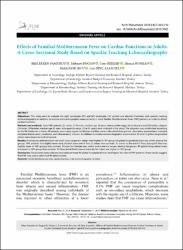| dc.contributor.author | Erken Pamukçu, Hilal | |
| dc.contributor.author | Doğan, Mehmet | |
| dc.contributor.author | Özişler, Cem | |
| dc.contributor.author | Sunman, Hamza | |
| dc.contributor.author | Pamukçu, Melih | |
| dc.contributor.author | Dinç Asarcıklı, Lale | |
| dc.date.accessioned | 10.07.201910:49:13 | |
| dc.date.accessioned | 2019-07-10T19:49:32Z | |
| dc.date.available | 10.07.201910:49:13 | |
| dc.date.available | 2019-07-10T19:49:32Z | |
| dc.date.issued | 2019 | en_US |
| dc.identifier.citation | Erken Pamukçu, H., Doğan, M., Özişler, C., Sunman, H., Pamukçu, M. ve Dinç Asarcıklı, L. (2019). Effects of familial mediterranean fever on cardiac functions in adults: A cross-sectional study based on speckle tracking echocardiography. Archives of Rheumatology, 34(2), 204-210. https://dx.doi.org/10.5606/ArchRheumatol.2019.7005 | en_US |
| dc.identifier.issn | 2148-5046 | |
| dc.identifier.issn | 1309-0283 | |
| dc.identifier.uri | https://dx.doi.org/10.5606/ArchRheumatol.2019.7005 | |
| dc.identifier.uri | https://hdl.handle.net/20.500.12511/1637 | |
| dc.description | WOS: 000469269200010 | en_US |
| dc.description.abstract | Objectives: This study aims to evaluate the right ventricular (RV) and left ventricular (LV) systolic and diastolic functions with speckle tracking echocardiography in addition to routine echocardiographic measurements in adult familial Mediterranean fever (FMF) patients in order to detect cardiac functions. Patients and methods: Sixty FMF patients (23 males, 37 females; median age 35 years; interquartile range, 26 to 38 years) and 20 healthy subjects (10 males, 10 females; median age 31 years; interquartile range, 25 to 35 years) were included in the study. The diagnosis was established according to the Tel-Hashomer criteria. All patients were using regular colchicine and they were in the attack-free period. Laboratory examinations included complete blood count, creatinine, and inflammatory markers. In addition to routine echocardiographic examination, RV and LV global longitudinal strains were measured and compared. Results: Erythrocyte sedimentation rate and C-reactive protein values were higher in FMF group. LV global longitudinal strain was similar among the groups. FMF patients had slightly lower early diastolic trans-mitral flow (E) values than controls. As similar as the mitral E flow, tricuspid E flow was slightly lower in FMF groups than controls. RV ejection fraction was similar and in normal ranges among the groups. RV global longitudinal strain was lower in FMF group than controls. RV Myocardial Performance Index (or Tei index) was higher in FMF group. Conclusion: The present study indicates low values of mean RV global longitudinal strain and higher Tei index in FMF patients. These results suggest that FMF may cause subclinical RV deterioration. | en_US |
| dc.language.iso | eng | en_US |
| dc.publisher | Turkish League Against Rheumatism | en_US |
| dc.rights | info:eu-repo/semantics/openAccess | en_US |
| dc.subject | Familial Mediterranean Fever | en_US |
| dc.subject | Speckle Tracking | en_US |
| dc.subject | Strain Echocardiography | en_US |
| dc.subject | Tei Index | en_US |
| dc.title | Effects of familial mediterranean fever on cardiac functions in adults: A cross-sectional study based on speckle tracking echocardiography | en_US |
| dc.type | article | en_US |
| dc.relation.ispartof | Archives of Rheumatology | en_US |
| dc.department | İstanbul Medipol Üniversitesi, Tıp Fakültesi, Dahili Tıp Bilimleri Bölümü, Kardiyoloji Ana Bilim Dalı | en_US |
| dc.authorid | 0000-0002-5794-9730 | en_US |
| dc.identifier.volume | 34 | en_US |
| dc.identifier.issue | 2 | en_US |
| dc.identifier.startpage | 204 | en_US |
| dc.identifier.endpage | 210 | en_US |
| dc.relation.publicationcategory | Makale - Uluslararası Hakemli Dergi - Kurum Öğretim Elemanı | en_US |
| dc.identifier.doi | 10.5606/ArchRheumatol.2019.7005 | en_US |
| dc.identifier.wosquality | Q4 | en_US |
| dc.identifier.scopusquality | Q4 | en_US |


















